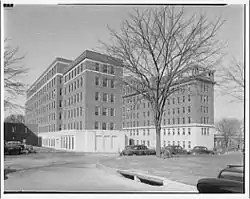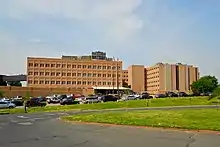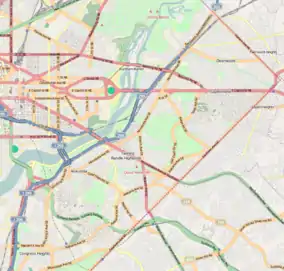Gallinger Municipal Hospital Psychopathic Ward
The Gallinger Municipal Hospital Psychopathic Ward consisted of three hospital buildings in the Southeastern Quadrant of Washington, D.C.
Gallinger Municipal Hospital Psychopathic Ward | |
 Gallinger Municipal Hospital Psychopathic Ward in 1949 | |
| Location | Reservation 13, 19th St. and Massachusetts Ave., SE, Washington, District of Columbia |
|---|---|
| Coordinates | 38°53′4″N 76°58′37″W |
| Area | 3 acres (1.2 ha) |
| Built | 1920 |
| Built by | George E. Wynne |
| Architect | Snowden Ashford |
| Architectural style | Colonial Revival |
| NRHP reference No. | 89000074[1] |
| Added to NRHP | February 27, 1989 |
History
These buildings were built in 1920–1923 to the Colonial Revival design of Washington architect Snowden Ashford. Local contractor George H. Wynne constructed the buildings for $766,200. By 1924 it had been featured in the journal Modern Hospital and was also described in 1928 in the standard text The American Hospital of the Twentieth Century.[2]

The hospital was named for Senator Jacob Harold Gallinger of New Hampshire, who sponsored the bill for its construction in the Senate.[3]
It was renamed D.C. General Hospital in 1953, and closed in 2001.[4]
Construction of a prison on the site was planned in 1986, with preservationists contesting the plan until 1989.[5] The buildings were listed on the National Register of Historic Places in February, 1989 and were demolished c. 1990.[6]
References
- "National Register Information System". National Register of Historic Places. National Park Service. July 9, 2010.
- Bushong, William B. (1988). "NRHP Nomination, Gallinger Municipal Hospital Psychopathic Ward". National Register of Historic Places. Retrieved March 28, 2012.
- "Municipal Hospital". The Garment Worker. 22: 16. 1922. Retrieved March 28, 2012.
- "Visit: Historic Medical Sites Near Washington DC". www.nlm.nih.gov.
- D.C. Appeals Court Clears Way For Building of Prison Here; Panel Refuses to Block Gallinger Demolition, Elsa Walsh, Washington Post, June 9, 1989.
- DC Inventory of Historic Sites - G Archived 2014-04-15 at the Wayback Machine


